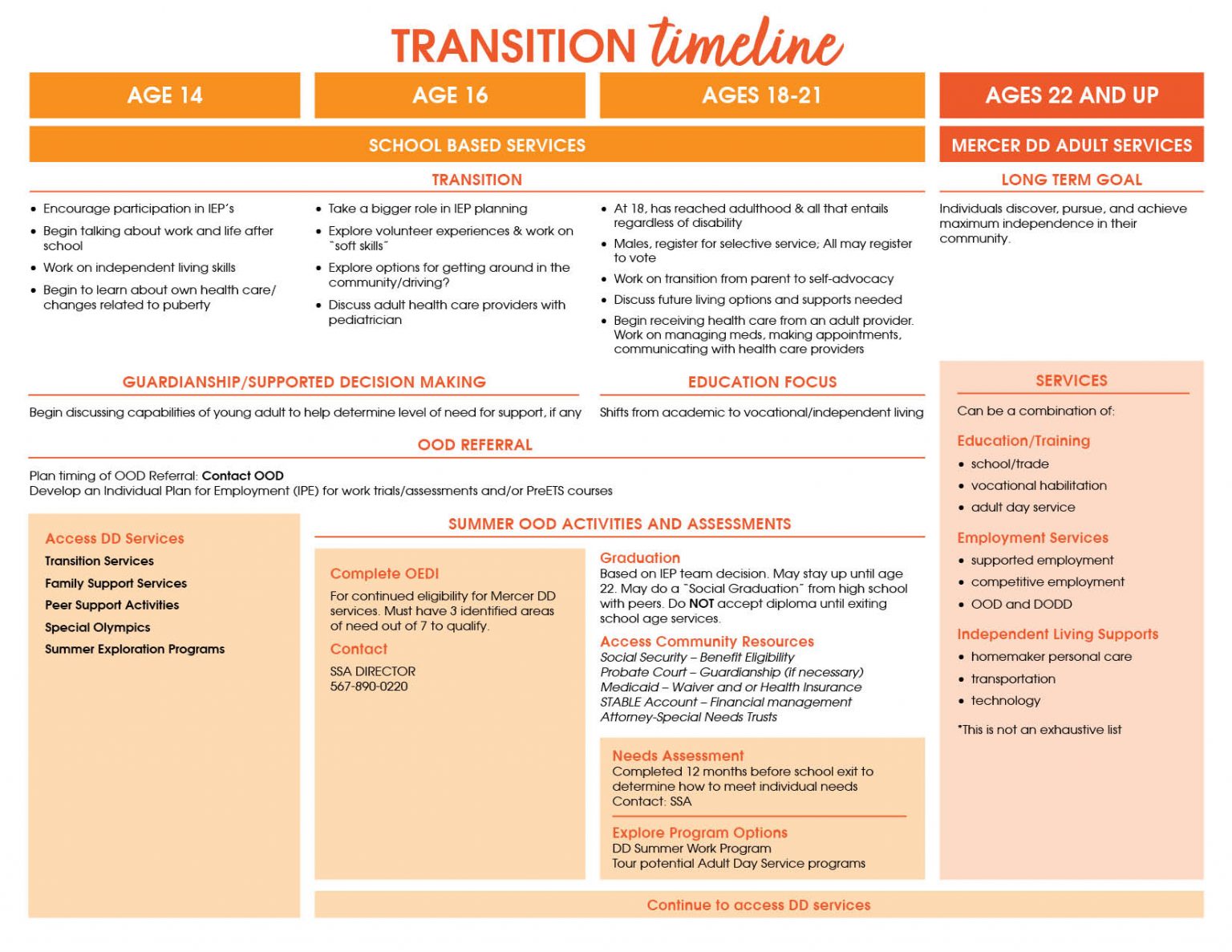At age 14, transition planning becomes part of the Individual Education Plan (IEP). Students will spend time determining their preferences, interests, needs, and strengths/skills. Figuring out and supporting the student’s future goals are the focus of transition planning and services.
Three areas are addressed on the transition section of the IEP:
The transition plan is updated at least yearly. It will become more detailed as the student’s goals become clearer. For more detailed information on students with IEPs and transition planning, check out the links below.
This is the team of people who will support the student/family through the high school transition years. This team works together to help plan for the goals, activities, and services the student needs for success in adulthood.
This team approach helps to:
1) increase the knowledge of services available for the student
2) determine the best time to access the different services, and
3) see how each service/agency can support the student’s vision for the future.
The team will often look at the student’s final goals and plan backwards. This is called Backwards Planning. This makes sure that the student gets all the services they need at the right time.
STUDENT
The student must be invited to their own IEP meeting beginning at age 14. If the student is not included in the actual meeting, it is still important that the student be involved in the planning prior to the meeting.
PARENTS/GUARDIANS
Parents/guardians have a unique perspective of the student. A willingness to share this is helpful to other team members seeking to support the student.
SCHOOL TEACHERS/STAFF
The student’s teacher(s) are the parent’s first and most important contact. Having an open and positive relationship with the student’s teachers leads to the best outcome for the student.
DISTRICT SPECIAL EDUCATION SUPERVISOR/REPRESENTATIVE
This representative of the school district works with the team to make sure each student receives a free and appropriate education.
OTHER SUPPORTING AGENCIES
Individuals from local agencies or other school programs may also be part of the team. Include those who are or may be working with the student in the future. Starting connections with adult agencies early allows good relationships to develop.
If you are ready to seek or discuss employment assistance, contact Traci Richard at 419-204-1585.
If you would like to learn specifics about Tri-Star, Vantage, Career Pathways, Project Search, MCESC Transition Class, Community Learning Center, or Rose Academy, visit the Education/Training tab at the top of the page.
If your student is being served by Mercer DD, please invite his/her SSA. The SSA can assist the family with Social Security, Medicaid Waivers, and other needs as they arise.
If you wonder if your student may qualify for services, please contact the SSA Director at Mercer DD 567-890-0220.
If your student is being served by Foundations or another private provider, this person may offer valuable insights to the team and can be included in future planning.
If you would like support from a parent who can assist you in working with the schools or other agencies, contact the Mercer County Parent Mentor at 419-586-6628.
If someone works closely with your student, knows them well, and could share information valuable in planning for a successful future, please invite them to be part of the team discussion.
The million dollar question from parents of students entering the transition years is “What do I need to do, and when do I need to do it?” A simple question, with a very difficult answer! Each student is unique, and while we celebrate that uniqueness, each student’s timeline is just as unique. In an effort to give parents a general timeline of what may need to happen and when, please see the QUEST Transition Timeline below or Download this helpful PDF.

Regardless of Disability, at 18:
Future panning is especially important. It is wise to begin thinking about what the student may need well before 18. Some students may be fine with making decisions on their own. Some may rely on the natural support of trusted adults. Others may need more. It is good to know that there are alternatives available to meet each need. The following links provide further information on many things to consider when a youth with differing needs reaches adulthood.
During the graduation ceremony, most seniors receive their diploma. Based on an IEP team decision, some do not. These students may stay in school and receive services longer. Students may stay until their 22nd birthday if they have not yet met their post-secondary goals. This extra time allows students to mature and gain more work and life skills. Their diplomas are presented to them by their home district when they leave school services. The discussion on when a student plans to graduate is an important one for transition planning.
Mercer County Quest
Discovering Your Path To Adulthood
567-890-1202

Menu